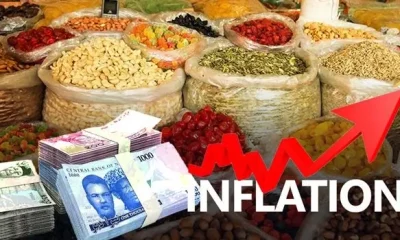International
UK Annual Inflation Hits 13-Month Low, Remains Elevated at 8.7%

-
UK annual inflation rate drops to a 13-month low of 8.7 percent in April.
-
This could be perceived as due to weaker energy prices compared to prices of the previous year.
-
Grant Fitzner, the Chief Economist at the ONS, noted that while the inflation rate had decreased, prices still remained significantly higher than the same period last year.
EKO HOT BLOG reports that in a significant development, the annual inflation rate in the United Kingdom dropped sharply to a 13-month low of 8.7 percent in April, primarily due to weaker energy prices compared to the previous year, according to official data released on Wednesday.
The rate of price increases decelerated from 10.1 percent in March, marking the first time inflation has fallen below 10 percent since August of the previous year, as reported by the Office for National Statistics (ONS).
EDITOR’S PICKS
-
Akpabio Woos Labour Party, NNPP As Senate Presidential Candidate Campaign Heats Up
-
APC Urges Court To Dismiss PDP’s Request For Televised Tribunal Proceedings
-
NIS’s Fight Against Passport Corruption: 8 Officers Sacked, 80 On Trial
At 8.7 percent, it was the lowest level recorded since March of the previous year when the rate stood at 7.0 percent.
Grant Fitzner, the Chief Economist at the ONS, noted that while the inflation rate had decreased, prices still remained significantly higher than the same period last year, particularly with food price inflation reaching historic highs.
Despite the notable decline, April’s inflation rate remained above the Bank of England’s (BoE) prediction of 8.4 percent for the same month.
Furthermore, the annual inflation rate in the UK for April was the highest among the Group of Seven (G7) nations, which includes Canada, France, Germany, Italy, Japan, and the United States.
The BoE’s target inflation rate of 2.0 percent appears distant, and the UK government has stated its expectation for inflation to drop to approximately 5.0 percent by the end of the year.
Fitzner explained that last month’s notable decrease in inflation was primarily due to the absence of substantial energy price hikes observed in the previous year. However, this decline was partially offset by increased costs of second-hand cars and cigarettes.

The release of this data follows a significant reversal in the International Monetary Fund’s (IMF) forecast for the UK economy. Just one month after predicting a contraction, the IMF now expects the UK’s economy to grow by 0.4 percent in 2023, as stated in its latest outlook report, citing weaker energy prices as a contributing factor.
Finance Minister Jeremy Hunt acknowledged the positive trend of inflation entering single digits but expressed concern about rising food prices. Hunt mentioned that the government had taken decisive actions to address inflationary pressures.
FURTHER READING
-
Obasanjo Warns Against Failure To Achieve Nigeria’s Full Potential
-
‘Tinubu Can Govern Nigeria From Russia After Inauguration’ – APC Chieftain
-
Atiku Sends Warm Wishes To Governor Adeleke On His Remarkable 63rd Birthday
As the UK continues to grapple with inflationary challenges, policymakers and economic experts will closely monitor the trajectory of inflation and its implications for the overall economy.
Click to watch our video of the week
Advertise or Publish a Story on EkoHot Blog:
Kindly contact us at [email protected]. Breaking stories should be sent to the above email and substantiated with pictorial evidence.
Citizen journalists will receive a token as data incentive.
Call or Whatsapp: 0803 561 7233, 0703 414 5611













